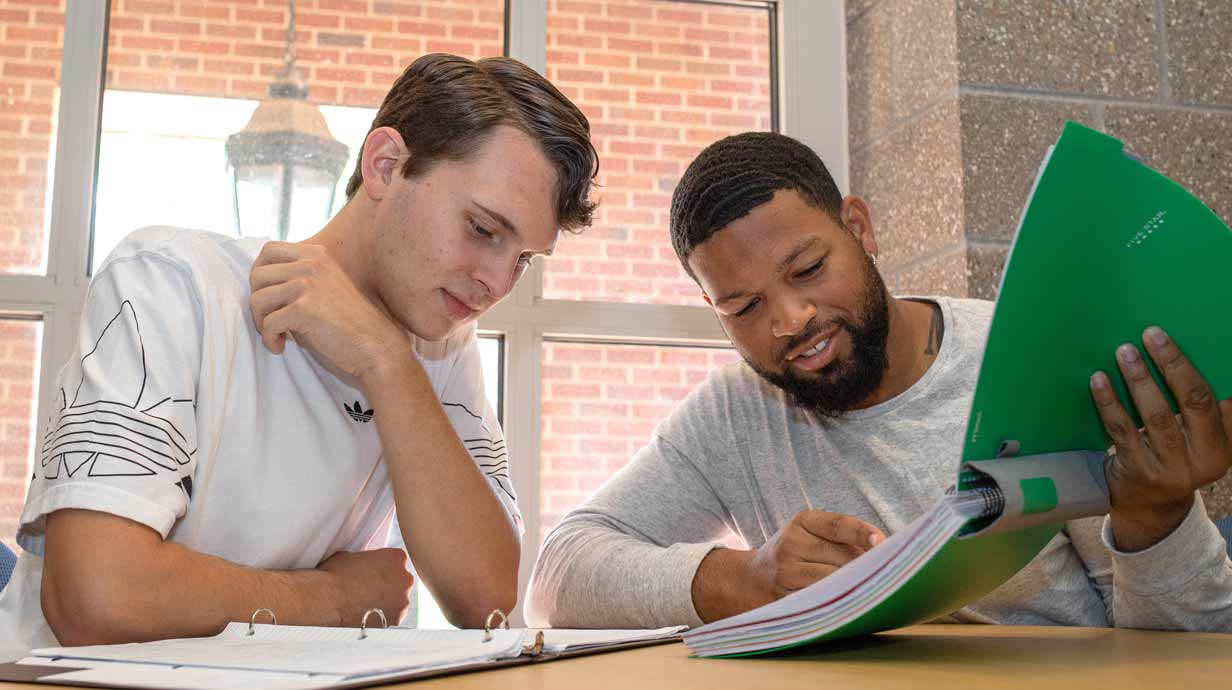
Bachelor of Arts in Economics
The Department of Economics in the College of Liberal Arts offers the B.A. in Economics. Using mathematical and statistical models, economists consider how resources such as labor, land, money, and technology are distributed. Economics majors gain a broad understanding of the field of economics as well as skills in statistics, data analytics, research methodology, and communication.
Students may choose between the B.A. and B.S. degrees in economics.
B.A. vs B.S.
- The Bachelor of Arts degree has a social science perspective on the questions of economics. This degree prepares students for many positions in business and government. Students take a broader and deeper general education foundation and complete a minor field of study or double major.
- The Bachelor of Science degree is a more technical and quantitative degree, and is more suitable for those students wishing to prepare for graduate study in economics or related disciplines. They are prepared for employment in the rapidly growing technical sector of the U.S. economy. The B.S. degree requires additional coursework in mathematics and statistics, as well as requiring the completion of more quantitative economics classes.
Economics majors in either degree program can choose from two option emphases:
- Financial Economics
- Law and Economics
The Value of an Economics Degree
The economics major helps develop analytical skills, a strong quantitative background, and clarity and precision of expression. Knowledge of the operations of complex economic systems and their institutions provides skills applicable to a wide variety of job responsibilities in a number of occupational areas.
Related careers to economics include lawyer, actuary, policy planner, stock broker, bank examiner, faculty member, labor relations specialist, venture capitalist, cost analyst, market research analyst, development officer, controller, financial planner, marketing officer, chief financial officer, and insurance analyst.
On this Page…
Program Information
Degree
B.A. in Economics
Emphases
Financial Economics ;
Law and Economics
Required Credit Hours
120
Program Type
Major
Minor
Program Location
School
Duration
4 Years
Degree Requirements
Find out about credit hour and course requirements for the B.A. in Economics from the 2025-2026 catalog.
Students in the College of Liberal Arts earning the B.A. degree have a common set of 48-50 hours of general education. The specific courses taken to complete the categories of general education may differ between majors.
Categories of General Education:
- First Year Writing I, II
- English Literature Survey
- Modern or Ancient Language
- History
- Additional Humanities
- Fine or Performing Arts Appreciation
- Mathematics
- Social Sciences
- Natural Sciences
To see the details for these general education requirements, visit the UM online catalog or the degree sheet attached at the top of this webpage.
Students in the B.A. in Economics complete 30 credit hours of economics courses. Students also complete a minor field of study or double major.
Required courses- Econ 202: Principles of Microeconomics
- Econ 203: Principles of Macroeconomics
- Econ 230: Economic Statistics I
- Econ 398: Intermediate Microeconomics
- Econ 399: Intermediate Macroeconomics
- 5 elective Econ courses at the 200 level or higher.
The Financial Economics emphasis provides students a well-rounded background in monetary and financial institutions as well as the various different types of financial instruments that populate modern financial markets. The emphasis will not only teach students about corporate finance, portfolio theory, and asset pricing, but also about monetary and financial history and institutions. Students develop quantitative economic reasoning skills that prepares them for a career in policy, banking, and research.
Students complete 15 hours (5 courses) from the following list:
- Econ 303: Money and Banking
- Econ 369: Bitcoin & Monetary Economics
- Econ 402: Econometrics
- Econ 409: Computational Macroeconomics
- Econ 410: Financial Economics
- Econ 411: Asset Pricing
- Econ 412: Financial Econometrics
- Econ 425: American Financial History
Students interested in attending law school after graduation should choose the law and economics emphasis. With tools of economic analysis, students will learn to predict the effects of particular legal rules, to explain why particular legal rules exist, and to analyze whether particular legal rules should exist. The Law and Economics emphasis equips students with the tools and knowledge to examine various aspects of the legal system, torts, contracts, property rights, the economics of litigation, antitrust law, and regulation.
Students complete 15 credit hours (5 courses) from the following list:- Econ 307: Applied Price Theory
- Econ 312: Law and Economics
- 3 courses from:
- Econ 313: Advanced Law and Economics
- Econ 324: Experimental Economics
- Econ 401: Government and Business
- Econ 410: Financial Economics
- Econ 417: Labor Economics
- Econ 503: Industrial Organization
- Econ 505: Public Finance
- Econ 507: Economics of the Family
- Econ 545: Game Theory & Strategic Thinking
- Econ 550: Contract Theory
The minor in Economics is designed to complement majors such as business, political science, public policy leadership, mathematics, and history.
A minor in Economics consists of 18 credit hours (6 courses):
- Econ 202: Principles of Microeconomics
- Econ 203: Principles of Macroeconomics
- Econ 398: Intermediate Microeconomics
- Econ 399: Intermediate Macroeconomics
- 2 additional economics courses at the 200-level or higher
Department Opportunities
Video: What is Economics?
Hear firsthand from students and faculty about the Economics program.
What Jobs Can I Get with an Economics Degree?
- President, Medical Assurance Company of MS
- President/CEO, First Guaranty Bank
- Senior Audit Associate, KPMG
- Senior Analyst, PricewaterhouseCoopers
- Vice President, Bank of America
- Principal Rate Analyst, MS Power Co.
- National Account Executive, AT&T
- Senior IT Sales, IBM
- Senior Power Trader, Tenn. Valley Authority
- Founding Chairman, Burson-Marsteller
- Former US Representative: Travis W. Childers
- AidData Manager, Global Research Institute
- Faculty, Texas Tech University
- Partner/Attorney, Balch & Bingham
- Attorney, Butler Snow
- Research Analyst, MS Dev. Authority
- State Auditor, Mississippi

Meet an Alum
I chose UM because it gave me an opportunity like no other university to pursue my economics degree. Since I stepped foot on campus, I fell in love with it. The professors are very passionate about what they teach, which I believe is one of the greatest qualities to have as an instructor.
Jonathan Dabel (B.A. in Economics and Public Policy Leadership)
Emerson National Fellow, Congressional Hunger Center
Why Major in Economics in Preparation for Law School?
According to national data, economics majors have higher LSAT scores and have among the highest acceptance rates to law school. Lawyers who were undergraduate economics majors also tend to earn higher incomes.
At the core of the study of market-based economies is the role of private property and private property rights. This creates a natural synergy between the study of markets and the law as many areas of law require some working knowledge of economics. One can examine the economic foundations of property law, torts, criminal law, contracts, and anti-trust.
The Pre-Law Advising Office will help you every step of the way to law school. Example of our services include:
- Recommendations of courses to prepare for the LSAT and law school
- Suggestion of a timeline to apply to law school, including how and when to study for the LSAT, when to take the LSAT, and when to prepare all documents for admission
- Notice of pre-law events and opportunities on and near campus
- Coordination of panel discussions with law school admissions representatives
- Guidance in researching law school options
- Answers to questions related to a law career
- Feedback on your personal statement
- Help with the application process on the Law School Admissions Council (LSAT) website
Welcome to the College of Liberal Arts
As Coordinator of Student Recruitment for the College of Liberal Arts, I work with students, and their parents, who are interested in attending UM for their undergraduate degrees. I coordinate personalized visits to our departments, answer questions about the majors and programs in the CLA and handle all recruitment communications from the CLA. Please feel free to send me any questions you may have. It is my job to make sure you have everything you need to make an informed decision on where to spend your college career, and I hope it will be with the College of Liberal Arts at the University of Mississippi!
Annabelle Harris
Admissions Counselor
Future CLA Students

College of Liberal Arts Undergraduate Students
We invite future undergraduates to learn about the College of Liberal Arts, the value of the liberal arts education, our programs, career opportunities, and resources to help you succeed. You can also request a personalized degree sheet.
Next Steps
Explore Affordability
We have a variety of scholarships and financial aid options to help make college more affordable for you and your family.
Apply to the University of Mississippi
Are you ready to take the next step toward building your legacy?
